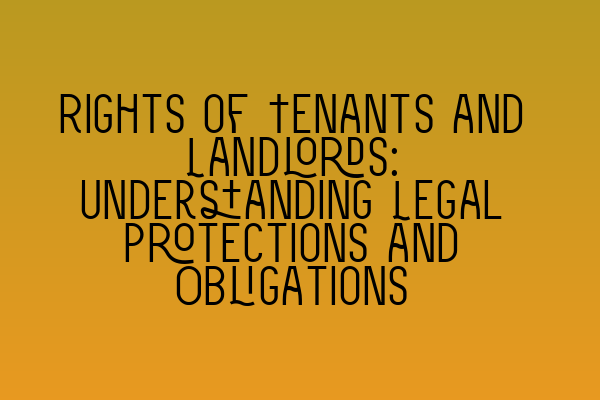Rights of Tenants and Landlords: Understanding Legal Protections and Obligations
As a tenant or a landlord, it is crucial to have a clear understanding of your rights and obligations under the law. This knowledge will not only protect your interests but also ensure a harmonious and mutually beneficial landlord-tenant relationship. In this blog post, we will explore the legal protections and obligations that tenants and landlords have, shedding light on key aspects of property law and land law.
Tenants’ Rights and Protections
1. Right to a Habitable Property: One of the fundamental rights of tenants is the right to occupy a safe and habitable property. This means that landlords are legally obligated to provide tenants with premises that meet basic health, safety, and structural standards. If a landlord fails to fulfill this obligation, tenants have the right to request repairs or seek legal remedies.
2. Right to Quiet Enjoyment: Tenants have the right to peacefully and undisturbedly enjoy their rented property. Landlords cannot enter the premises without sufficient notice and permission, except in emergency situations. Any unauthorized intrusion by the landlord is a breach of the tenant’s right to quiet enjoyment.
3. Security of Tenure: Many jurisdictions provide tenants with security of tenure, which means they cannot be arbitrarily evicted. Landlords must follow specific legal procedures, such as providing adequate notice and valid grounds for eviction, before terminating a tenancy. It is crucial for both tenants and landlords to understand the eviction process to ensure compliance with the law.
4. Fair Rent: In some jurisdictions, tenants have the right to be charged a fair rent. Rent control laws may restrict the amount a landlord can charge for a rental property or limit the frequency or extent of rent increases. Understanding the applicable rent control regulations is essential for both landlords and tenants.
Landlords’ Rights and Obligations
1. Right to Receive Rent: Landlords have the right to receive rent payments on time and in full. Tenants are legally obligated to pay rent as specified in the lease agreement. However, landlords must provide tenants with proper documentation, such as rent receipts or invoices, to ensure transparency and accountability.
2. Right to Maintain the Property: Landlords have the responsibility to maintain the property in a reasonable and habitable condition. This includes performing necessary repairs, ensuring proper sanitation, and addressing any health or safety issues promptly. Failure to meet these obligations may expose landlords to legal liabilities.
3. Right to Recover Possession: Landlords have the right to regain possession of their property at the end of a tenancy or in cases of lease violations. However, landlords must follow proper legal procedures and obtain a court order for eviction. It is essential to seek legal advice to ensure that eviction processes are carried out correctly.
4. Compliance with Housing Regulations: Landlords are obligated to comply with all relevant housing regulations and statutes. These may include obtaining necessary licenses, adhering to building codes, and ensuring that rental properties meet specific standards. Violations of housing regulations can result in severe penalties and legal consequences for landlords.
Understanding the rights and obligations of tenants and landlords is crucial for maintaining a balanced and lawful landlord-tenant relationship. Both parties should familiarize themselves with the applicable property and land laws in their jurisdiction to ensure compliance and protect their interests.
To further enhance your knowledge of property law and land law, we recommend exploring our related articles:
– SQE 1 Practice Exam Questions: Test your understanding of property law concepts and prepare for the SQE 1 examination with our practice exam questions.
– SQE 1 Practice Mocks FLK1 FLK2: Gain hands-on experience and build confidence in tackling property law and land law questions with our SQE 1 practice mocks.
– SQE 2 Preparation Courses: For those aspiring to become qualified solicitors, our SQE 2 preparation courses provide comprehensive guidance and resources on property law and other relevant areas.
– SQE 1 Preparation Courses: Prepare for the SQE 1 examination and develop a solid foundation in property law and land law through our tailored preparation courses.
– SRA SQE Exam Dates: Stay updated with the latest examination dates and registration deadlines for the Solicitors Regulation Authority (SRA) SQE exams.
By understanding your rights and obligations as a tenant or landlord, you can navigate the complexities of property law with confidence and ensure a fair and lawful tenancy. Remember to seek legal advice specific to your circumstances for accurate and personalized guidance.
